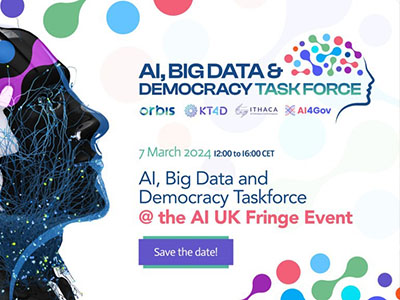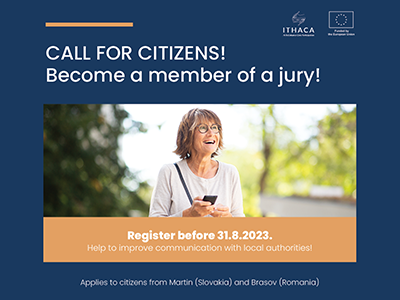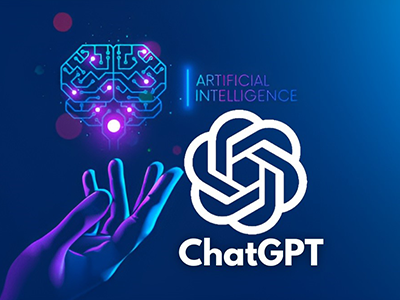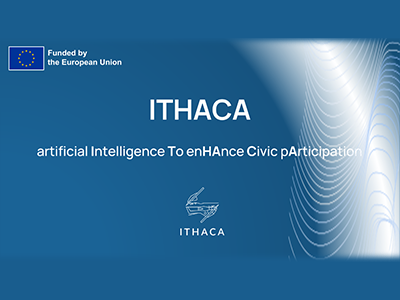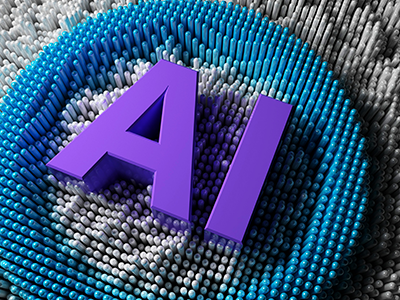Artificial Intelligence (AI) and Big Data technologies have become integral parts of our society, influencing various aspects of democratic governance and communication. However, alongside their potential benefits, they also pose challenges to democratic values and principles. Addressing these challenges requires a comprehensive approach known as responsible AI.
MEETING VULNERABLE CITIZENS TO IDENTIFY THEIR NEEDS
The ITHACA project partners plan to assess the ability of artificial intelligence (AI) to enhance citizens´ participation in the local governance. For this purpose, two participatory workshops will be organized in the project pilot cities of Martin (Slovakia) and Brasov (Romania) in September 2023.
NEW OECD.AI EXPERT GROUP ON AI FUTURES WAS ESTABLISHED
Artificial intelligence is discussed for several years, officials and politicians are thinking about its risks. Most AI policy discussions focus on the challenges we already face today, and understandably so.
OECD experts work on some existing issues for some time, including work by the OECD Expert Groups on Risk and Accountability, Incidents, and Compute & Climate.
WHAT DOES ChatGPT THINK – CAN ARTIFICIAL INTELLIGENCE ENHANCE CITIZENS´PARTICIPATION IN LOCAL GOVERNANCE?
Since the ITHACA project is all about using artificial intelligence (AI), we were tempted to ask for its view on our main goal – improving the engagement and communication of citizens with local authorities.
QUALITY STANDARDS OF THE ARTIFICAL INTELLIGENCE
The new ISO and IEC 25059 are here to ensure that AI systems align with the highest possible quality standards. Thus safety, reliability & effectiveness in real-world applications can be secured.
ITHACA PROJECT AIMED TO ASSESS THE POTENTIAL OF AI TO ENHANCE CIVIC PARTICIPATION
The ITHACA consortium was currently preparing an online discussion with Representatives of Vulnerable Social Groups which took place on July 4th, 2023. This will be followed by two participatory Introductory Workshops with the Citizens’ Jury, which, will be carried out in the ITHACA pilot cities, Martin (Slovakia) and Brasov (Romania) in September 2023.
The aim of these activities is to facilitate the participation of all citizens in the co-design of the online democratic platform that it will be deployed and test in the municipalities of Brasov (Romania) and Martin (Slovakia). Given the Socially Vulnerable Groups’ Representatives expertise and their day-to-day interaction with socially vulnerable citizens they have very good knowledge of citizens´ particular needs and requirements when it comes to digital tools, inclusion and civic participation. Their contribution will be helpful to design a more inclusive platform.
AI: NEW AGREEMENT BETWEEN UNESCO AND THE EU TO SPEED UP THE IMPLEMENTATION OF ETHICAL RULES
UNESCO and the European Commission have just signed an agreement to accelerate global implementation of the UNESCO Recommendation on the ethics of artificial intelligence adopted in November 2021 by the 193 Member States of the Organization.
Central to the Recommendation are four core values which lay the foundations for AI systems that work for the good of humanity, individuals, societies and the environment:
AI: STARTING TO NEGOTIATE RULES FOR SAFE AND TRANSPARENT AI
Parliament is going to negotiate with the national governments and the European Commission on the final shape of the legislation, which will be a decisive step in the European Union becoming the world’s first region to regulate artificial intelligence (AI).
AI ACT: A STEP CLOSER TO THE FIRST RULES ON AI
New transparency and risk-management rules for AI systems to ensure a human-centric and ethical
development of Artificial Intelligence (AI) in Europe.
COUNTRIES HAVE ENOUGH COMPUTE CAPACITY TO ACHIEVE NATIONAL AI STRATEGIES OR NOT?
The first report for policy makers to help assess and plan for the national AI compute capacity needed to
enable productivity gains and capture AI’s full economic potential is A blueprint for building national
compute capacity for artificial intelligence by OECD.

